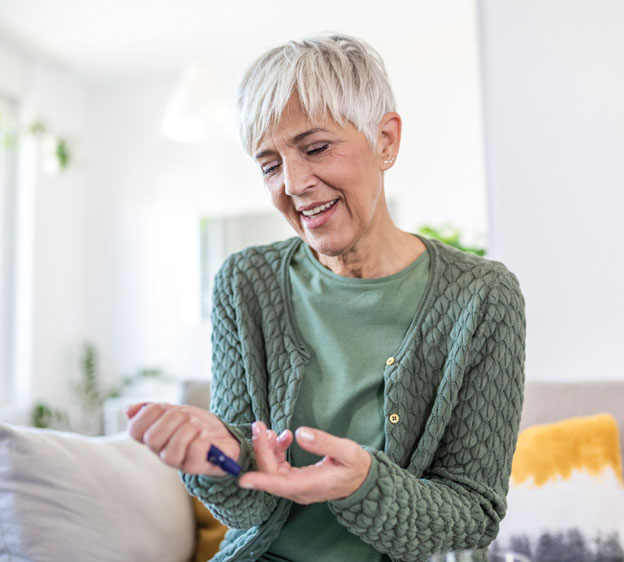
Recognizing diabetes can be tricky. This common chronic disease doesn’t always cause symptoms, at least not at first. Diabetes affects women differently than men, and many signs of diabetes in women can be easy to shrug off or attribute to something else.
Knowing these signs can help you seek care quickly, and early detection can set you on the path of effective diabetes management and reduce your risk of complications.
Read More: What Is Gestational Diabetes?
For Women, Diabetes Is Different
“Women’s experience with diabetes is different than men’s in many ways, starting with their risk factors,” says Dr. Bruce Vincent, a board-certified family medicine specialist at Beaufort Memorial Bluffton Primary Care. “Some factors, such as high blood pressure, unhealthy cholesterol levels, excess weight and an inactive lifestyle, apply to both women and men. Women, however, have unique risk factors, including polycystic ovary syndrome, weight gain after menopause and gestational diabetes, which is diabetes during pregnancy.”
Risk factors aren’t the only ways this disease is different in women. Women with diabetes are four times more likely to develop heart disease, a common complication of the condition, than women who don’t have diabetes. Men with diabetes are only twice as likely than men without diabetes to develop heart disease, according to the Centers for Disease Control and Prevention.
In addition, the Office on Women’s Health reports that women with diabetes have higher risks for blindness and depression compared with men who have diabetes, all the more reason for women to report potential signs of diabetes to their primary care provider.
Read More: Diabetes Do’s and Don’ts
Signs of Diabetes in Women: Early Clues
Type 1 diabetes and Type 2 diabetes — the major forms of the disease — differ in important ways, including how symptoms develop.
If you have Type 1 diabetes, your pancreas doesn’t make insulin, a hormone that helps transport sugar from food into cells to convert into energy. Without insulin, too much sugar stays in the blood, leading to high blood sugar levels. People with Type 1 diabetes often see symptoms develop quickly, sometimes within weeks.
Type 2 diabetes, the more common form of the disease, occurs when your body struggles to use the insulin it makes, which raises your blood sugar level. Symptoms of Type 2 diabetes can take years to appear, if they show up at all.
Regardless of type, early signs of diabetes in women and men can include:
- Frequent urination. Diabetes can have you visiting the bathroom more often, including at night.
- Increased thirst. You may feel the urge to drink more water and other fluids.
- Numbness in the hands or feet. Diabetes damages nerves and can reduce feeling in your extremities.
- Skin changes. Diabetes can lead to dry skin and slow wound healing.
- Unexplained weight loss. You may lose weight without effort, despite feeling hungrier than normal — another sign of diabetes.
- Vision changes. High blood sugar can damage blood vessels in the eyes, leading to blurry vision.
Read More: How You Can Use Exercise to Lower Blood Sugar
Additional Signs of Diabetes in Women
Stay alert for other, unique-to-women signs of diabetes, including disruptions to your menstrual cycle.
“For some women with diabetes, their periods become less predictable,” Dr. Vincent says. “They may have a heavier flow, or their periods may last longer than they used to.”
In addition, diabetes can increase the risk of a health problem with which many women, unfortunately, are familiar: urinary tract infections (UTIs). Around 60% of women will have a UTI at some point, according to the Urology Care Foundation.
“Diabetes reduces the body’s defenses against infections, including UTIs, by increasing blood sugar levels and hindering blood circulation,” Dr. Vincent says. “High blood sugar levels also increase women’s risk of vaginal yeast infections.”
If you develop frequent vaginal yeast or urinary tract infections, it’s worth investigating whether diabetes may be the cause.
Diabetes may also play a role if you have difficulty getting pregnant. This is due, in part, to how the disease can affect your periods. If you don’t have diabetes but develop gestational diabetes during pregnancy, you may have a higher risk for pregnancy-related high blood pressure and premature birth.
Your risk for diabetes increases after age 40, and some signs of the disease in women may not appear until then. These include:
- Less interest in sex. Diabetes-related changes, including nerve damage and poor circulation, can cause vaginal dryness, which can get worse with menopause. Vaginal dryness, in turn, can cause discomfort during sex.
- Postmenopausal symptoms. Diabetes doesn’t cause menopause but is linked with certain symptoms that can occur after your periods end. These include weight gain, which may force changes to your diabetes management plan, and vaginal dryness.
Read More: Understanding — and Managing — the Risk Factors of UTIs
Notice a Potential Symptom of Diabetes? Don’t Stay Silent
Just because you have to pee more often, have seen an uptick in UTIs or have abnormally dry skin doesn’t mean you have diabetes. Suspected signs of diabetes in women can have many potential causes. That’s why it’s important to see your primary care provider as soon as you notice something out of the ordinary. Your provider can rule out other causes and, if you have diabetes, create a personalized plan to help you manage the disease.
“Individualized diabetes care is so important,” Dr. Vincent says. “No two patients with diabetes are the same. Your primary care provider will set unique blood sugar targets to help protect your health. Additionally, they’ll create a multipronged, individualized strategy for managing diabetes, from taking medications to following a healthy eating plan to joining a fitness center to help you get active.”
Importantly, acting quickly when you notice potential signs of diabetes can help you stay ahead of complications for heart disease, as well as chronic kidney disease, vision loss and difficult-to-heal foot ulcers. Recognizing the signs of diabetes empowers you to take control of and protect your health.
Looking for a partner who can help you manage diabetes for the long term? Find a Beaufort Memorial primary care provider.

